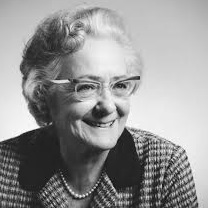
Was born in Finchley in Middlesex in 1908, the middle child and only daughter of the journalist Charles Gardner and his wife, also named Helen. She was eleven when her father died and the family thereafter made their home with her grandparents. Mrs Gardner, a very musical woman, was highly ambitious for her gifted daughter, who demonstrated artistic talent from an early age. Gardner's early education was at the North London Collegiate School. In 1926 she went to St Hilda's College, Oxford, and in 1929 obtained a first-class honours degree in English language and literature: in 1935 she became M.A. (University of Oxford).
Her teaching career began at the University of Birmingham, where she held a temporary post. After three years as an assistant lecturer at Royal Holloway College in London, she returned to Birmingham, as a member of the English department (1934-1941).
She became a tutor at Oxford in 1941 and was a fellow of St Hilda's College, Oxford from 1942. In 1966, she became Merton Professor of English literature in the University of Oxford, the first woman to hold this chair. Her specialist areas were T. S. Eliot, the Metaphysical poets, Milton and religious poetry, with many essays published on these subjects, as well as on literary criticism itself. She edited The New Oxford Book of English Verse, 1250-1950 (1972) and The Metaphysical Poets. She retired from the chair in 1975.
Her 1949 collection of essays, The Art of T. S. Eliot, is regarded a seminal work on the poet. In particular, she challenged the notion that Eliot was only accessible to those well-versed in his many allusions:
"It is better, in reading poetry of this kind, to trouble too little about the 'meaning' than to trouble too much. If there are passages whose meaning seems elusive, where we feel we are 'missing the point', we should read on, preferably aloud... We must find the meaning in the reading..."
She revisited Eliot's work in 1978 with her study of The Composition of Four Quartets, published by Faber and Faber.
Gardner was also the editor of an influential and authoritative edition of Donne's poetry in 1952 entitled "John Donne: the Divine Poems" in which she revises and corrects many disputed parts of the text (punctuation and word choice variants found in the various manuscripts and editions of Donne's poetry). Those editions include both the 1633 and 1635 editions of his collected works, the earlier editorial work of Herbert Grierson, and the manuscripts on which these works were based. This work was further revised and republished in 1978.
Gardner also compiled The Faber Book of Religious Verse (1972) and The New Oxford Book of English Verse (1972).
Her work met with great acclaim, and she was awarded the CBE in 1962 and a Dame Commander of the Order of the British Empire in 1967. She was also granted honorary degrees from Cambridge, London, Harvard, and Yale universities. She died in Bicester in 1986.
Helen Gardner was a lifelong Labour voter and, when she lived in Birmingham, canvassed for Labour in a Conservative area. She was one of the key witnesses for the defence in the obscenity trial of Lady Chatterley's Lover in 1960. The character of E. M. Ashford in Margaret Edson's Wit is based on Helen Gardner.